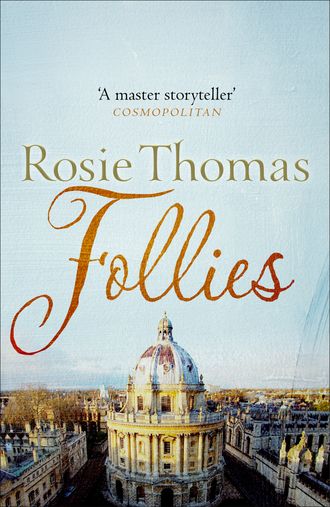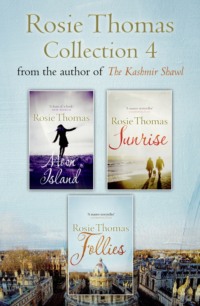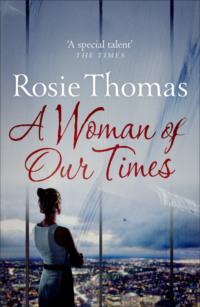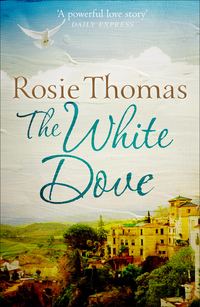
Полная версия
Follies
‘I suspect you’re quite bright enough,’ Tom said quietly.
‘You are a darling. And don’t worry, I’ve got enough native wit to handle Rosalind. Inherited from Daddy, no doubt. Oh Lord, he’ll be furious if I don’t even get to my first lesson. I don’t even know where the place is.’
Pansy fumbled in the soft Italian leather pouch bag that was slung over the back of her chair and brought out a list. ‘Ashmolean Museum?’
Oliver, who had been watching her with fascination, suddenly stood up. ‘I’m going over there. I’ll take you.’
Solicitously, just as he had done yesterday for Helen, he drew back her chair and helped her to her feet. Pansy put her hand on his arm, thoughtlessly accepting it as her right to be escorted and protected.
‘’Bye, then.’
‘Oliver …’ Helen had no idea what she wanted to ask him, but he half turned in response and she thought his face softened.
‘I’ll see you soon,’ he said. ‘At Follies.’
He was gone so quickly with Pansy that Helen found herself staring at the empty space where they had been.
I’ll see you soon. She would have to be content with that.
Opposite her Tom was staring blankly too. It was a moment before they faced each other and realised that they were alone.
‘Well.’ Tom was smiling crookedly. ‘Shall we finish the wine?’
Helen pushed her glass across to him. Instinctively, she liked Tom Hart and – more than that – he was Oliver’s friend. She could at least talk about him.
‘I’ve never met anyone like him before,’ she said softly.
‘Oliver? Neither have I. He’s got a lot of style, and I admire that. He doesn’t give a damn about anything either, and I don’t think that’s just because of who he is. Although that helps. Think of living in a place like Montcalm. Of coming from a family like that … holders of the highest offices in the realm for hundreds and hundreds of years.’
You’re impressed by that, Helen thought. Am I? Am I? Perhaps.
Tom was still talking. His dark eyebrows were drawn together over his high, beaked nose and his mouth, usually compressed in a sardonic line, curved wider as he looked into the distance.
‘That’s quite something, you know, to a Jewish boy like me. My family tree goes back no further than my great-grandfather. He was called Hartstein, and he arrived in New York with no more than the clothes he stood in. He scraped a kind of living for his wife and kids by doing piecework in the garment trade. The business he slaved for happened to have a sideline in theatrical costuming. My grandfather had a flair for that, took it over at the age of twenty, and ended up a celebrated costumier. And my father – well, my old man has a flair for everything. Greg Hart owns five Broadway theatres now, and a string more across the country.’
‘I think that’s more impressive than just being born a Mortimore,’ Helen told him gently.
Tom smiled at her in response, and she saw that although his face was stern and his mouth ungiving, there was real kindness behind his dark, hooded eyes.
‘Perhaps.’
‘What about you?’ she asked. ‘What are you really doing in Oxford, if you’ve got all that waiting for you in America?’
Tom picked up a fragment of bread from the tablecloth and rolled it between his fingers into a grey, doughy ball.
‘I’m in disgrace, as it happens. Serving out a year’s exile in the guise of doing my apprenticeship in the British theatre. By the time I get back, my old man reckons all the fuss will be forgotten.’
Helen stared at him, intrigued. She had forgotten herself enough not to worry about being tactful. ‘What fuss?’
‘D’you really want to know?’
‘Of course. What could be bad enough to deserve being banished from home for a whole year?’
Tom laughed shortly. ‘It’s not so bad. I miss New York, that’s all. Do you remember that production of The Tempest that was so successful in the West End last year? With Sir Edward Groves and Maria Vaughn?’
Helen nodded, dimly recollecting having read about it.
‘My father brought the production over for his summer season. With the original cast, starring the theatrical knight and his new wife Miss Vaughn.’
Helen remembered that, too.
‘Well, whatever Maria had married her knight for, it had nothing to do with bed. In spite of the fact that she’s very interested in that side of things herself. Most of us are, after all. When I was offered the choice, before the run had even started, I was hardly likely to turn her down. She’s very beautiful, and disturbingly sexy. Before long we were screwing each other at every possible opportunity. At my apartment, in her hotel room, in her dressing room. And that’s where Sir Edward caught us at it. Careless of me, really. The scene that followed was high drama – threats, screams, hysterical weeping, the whole works. It culminated with Sir Edward stamping down to my father’s office and announcing that the Hart family was not to be trusted, so he and Maria were back off to London and fuck the opening night. Greg flung himself into the scene like the old trouper he is. There were more accusations of filial disloyalty, immorality, perfidy and general filthiness. Of course, Edward really had no intention of missing out on the chance to bestow his Prospero on Manhattan. They compromised by despatching me to England instead. This job was fixed up for me in about forty seconds, and here I am.’
Helen thought for a moment. ‘Isn’t that rather hard on you? Surely your father must have seen your side, just a little?’
Tom laughed again.
‘Oh, it’s much more complicated than that. You see, Greg certainly had Maria carved out for himself. He does quite a good line in leading ladies – he’s always been very successful with women. And he’s used to thinking of himself as the young phenomenon. Suddenly, there he was, seeing that his own son had cut him out. What would it be next, he must have asked himself. His theatres. His whole empire, perhaps. So, get rid of the little bastard for a convenient space of time by packing him off to Oxford, England, to produce piddling student productions of the classics.’
‘Did you have to come?’
The answer came without a trace of hesitation. ‘Oh yes. If I want to get the business in the end, I do. And I want it very much. I love the theatre.’
‘Except for piddling little productions in Oxford.’
Tom shot her a quick glance, his eyebrows raised. ‘Yes. I asked for that. I didn’t mean it, except as a comparison with what I could be doing if I was back home. Of course this show is just as important in its way as the biggest musical spectacular on Broadway. That’s why I’ve taken so much care to get the casting right. And it’s why I’m so pleased with Oliver and Pansy. Particularly Pansy. I knew as soon as she walked into the theatre that she was the one I was looking for. She’s amazing, isn’t she?’
Tom’s habitual cynical expression had melted, replaced by an enthusiasm that was almost boyish.
‘Yes.’ Helen didn’t want to talk about Pansy Warren. She switched the subject again. ‘And you? Will you make a wild success of being here? It’s what happens in all the books.’
‘Not wild. There’s hardly scope. But I’ll do well enough.’
Helen knew that he would, from the determined lines etched in his dark face. Tom Hart was bound to succeed in whatever he did. It was in his blood. You’re probably quite ruthless, Helen thought. You can be kind too, but you wouldn’t let that impede you where it matters. Probably you just feel genuinely sorry as you plunge the hatchet in. I know I wouldn’t like to cross you.
Tom was looking at her now, his gaze level. ‘Why am I treating you to this self-centred recital? It must be something to do with your having such a calm, attentive face.’
I don’t want to be just a calm, attentive face. A sudden spurt of resentment took possession of Helen. I want to be beautiful, like Pansy and Chloe, the kind of woman that people look at, not talk at. I want to be rich, and confident, and amusing. It’s not fair. And then at once she felt ashamed again. You’re so lucky in so many things, she reminded herself. Think of Mum, and Graham. And Dad.
Tom turned from signalling to the waitress and saw a brightness in Helen’s eyes that might have been the start of tears. His hand touched hers.
‘What is it? Did I say something?’
She shook her head fiercely. ‘No. I just … remembered something. Look – it’s late.’
‘I know. I must go too.’ When the bill came, Helen remembered that Oliver and Pansy, unthinking, had left without paying their share.
‘Can I go halves with you?’ she ventured.
‘No. Of course not.’ Without even looking, Tom dumped a fistful of notes on the plate and stood up.
It’s just different for them, Helen told herself. It’s wrong of you to feel resentful.
Tom left her with a brief goodbye at Carfax. Helen turned to watch him for a moment as he walked off down the long, golden curve of the High. His clothes were stylish, almost flamboyant, and with his alert face and purposeful walk, he stood out in high relief from the anonymous blue denim crowds that drifted around him.
As soon as he was gone, Helen was surprised to feel the loss of his bracing company. The lunch had been uncomfortable, but for some reason her sharpest impression now was of this brisk American. He was as different from the ordinary run of University people as Oliver himself. Helen thought he was more than a little frightening, because his cleverness made him intolerant, but she remembered the kindness she had sensed in him as well as the flash of vulnerability when he had looked at Pansy Warren. She liked him, too, for the straightforward way he had told her the story of his exile to Oxford. Tom Hart would not be easy to know well, she reflected, but once he had committed himself, she guessed that he would be a valuable friend. Helen wondered if Pansy, in her glancing appraisal, had seen that too. No, she wouldn’t have. Beside Oliver’s glitter, Tom seemed saturnine and acerbic. And it was Oliver, inevitably, who had scooped Pansy up and spirited her away.
Helen sighed, stuck her hands in her duffel coat pockets and began to walk down St Aldate’s towards the river and Follies House.
As she stepped into the hallway and let the massive oak door swing to behind her, Helen knew immediately that there was something different about the old house. The dim, spidery spaces in the hall were deserted and looked just as they always did, but there was light filtering through from somewhere. And then the noise began – unbelievably loud rock music that bounced off the panelling and echoed along the stone floors. When she looked up, Helen saw that the door at the head of the stairs was open. A shaft of bright sunlight shone through it.
Pansy was home.
Helen knocked on the door jamb and, knowing that she wouldn’t be heard above the music, peered inside. Pansy was dancing alone and with her eyes shut. She was smiling a small, happy, secretive smile.
‘Hello.’ Helen had to shout. Pansy opened startled eyes.
‘Hel-lo. Sorry. D’you ever feel so happy that you just have to dance? Wait while I turn it down.’
‘That was a short tutorial,’ Helen said into the new quiet.
‘He didn’t wait, can you believe it? I wasn’t that late.’ Pansy was wide-eyed, genuinely surprised. ‘Anyway, it means I’ve got a lovely free afternoon now. Don’t go. Stay here and talk while I sort some of this junk out.’
Unlike Chloe, Pansy had made no effort to settle into her room. Suitcases and a huge trunk were all open, the tumbled contents showing that their owner had rummaged through in search of the things she needed without bothering to unpack anything. Pansy was standing in the middle of the jumble now, staring round in exasperation.
‘God, what a mess. I hate all this stuff. Wouldn’t life be easy if we were allowed to own only ten things each.’
Pansy, like Chloe, seemed to possess an unbelievable number of clothes.
‘No,’ said Helen a little sadly. ‘It’s nice to have things. I love clothes.’
Pansy glanced across at her and then scrabbled in another suitcase.
‘Do you? Would you like these? Kim bought these for me because she thought they were Oxford-y. I’ll never wear them, and they’d suit you.’
There were two Shetland jerseys, one in soft, sugared almond pinks and one in stronger blues. They had little round collars with picot edgings. She was holding out a skirt too, folds of pale grey fine wool challis.
There was a small, surprised silence.
‘I couldn’t possibly,’ Helen said stiffly. She would have loved to own such pretty things, but it was impossible. She was not so hard up that she needed to accept Pansy’s casual largesse.
‘What a pity, because I won’t wear them.’ Pansy shrugged dismissively and tossed the clothes back into the suitcase.
The silence was uncomfortable now.
Helen knew that she should go away, but it was unthinkable to leave without having mentioned Oliver. She had the impression that his name hovered in the air between them, waiting to be uttered.
‘Are you pleased about the part?’ she asked at last.
‘Oh, yes. So long as it doesn’t mean too much hard work. Still,’ Pansy was holding an evening frock up against herself, her head on one side to consider it. It was a frothy mass of Zandra Rhodes squiggles and ruffles, ‘… with two lovely men like that about, even rehearsing shouldn’t be too much of a bore.’
Now that the opening was here, Helen shied away from it.
‘Tom Hart’s rather exotic for Oxford,’ she said.
‘Mmmm. I wouldn’t choose him, though. Bit too saturnine and Jewish, if you call that exotic, for my taste.’
Of course, Helen thought, you do only have to choose. Not Oliver, please.
‘But Oliver, that’s different. Bit unfair of him to be so beautiful and a Mortimore, don’t you think? What can a girl do, confronted with that?’ And Pansy laughed, pleased with herself and with the pleasant prospect ahead of her.
Helen felt a slow, dull crimson flush creeping over her face. Her chest and throat felt tight, and her fingers itched with a sudden surge to slap Pansy’s bright face. The violence inside her astonished and frightened her. But this girl would take Oliver away, she knew that now, and in that instant she hated her. She must say something. Not let him go without a struggle.
Helen struggled to make her voice sound cool and light, but when at last it came out it shook and cracked.
‘Yes, Oliver and I …’ she faltered, not knowing how to put it.
Pansy swung round in genuine surprise.
‘You?’
Helen flinched. As she stared back at Pansy, she felt the ugly flush deepening over her face and neck. It was so humiliating, that surprise, the more so because it was completely natural. What could Oliver, it said, with his looks and his charm and his position, see in a little mouse like you?
‘Yes,’ Helen said, finding defiance in the anger that threatened to choke her. ‘Me. Why not?’
Pansy was looking defensive now, her eyebrows pulled into a frown over the chameleon blue eyes, and a trace of hurt lingering about her vulnerable, flower-like mouth.
‘I’m sorry. It’s just that … you didn’t look or behave as if you belonged together.’
Belonged together? How Oliver would hate that, Helen realised. She was giving Pansy the wrong impression, making her undefined relationship with Oliver seem too formal, but it was too late to backpedal now.
‘I don’t want to tread on anybody’s toes,’ Pansy added, with such clear sincerity that Helen’s anger faded as quickly as it had come. After all, Pansy had done nothing yet, except exist.
‘It’s all right,’ she said wearily. ‘You aren’t. Nobody belongs to anybody. Forget it.’
‘Forget what?’
Chloe had come up the stairs without either of them hearing her. Now she was standing in the open doorway, almost striking a pose. She had one hand on her hip and the other was raised to coil the dark red hair into a knot on top of her head. The stance emphasised her height and slimness and for a moment as she stood there, it was Chloe who was the beauty and not Pansy.
Pansy’s sharp stare missed nothing.
‘Hello. You were at the audition too, weren’t you?’
‘Pansy,’ said Helen, ‘this is Chloe Campbell. Rose’s third tenant.’
There was a little, wary moment as the two women looked at each other. Then, immediately after the practised appraisal of attractive women confronting one another, came the answering smiles of complicity. To Helen, watching, it was as if they belonged to a desirable club from which she would be forever excluded. She was oppressed by a sense of her own plainness and dowdiness.
‘Forget what?’ Chloe was asking Helen again.
‘We were talking about Oliver Mortimore,’ Pansy said, before Helen could frame an answer. ‘Helen was kindly warning me off.’
Helen wished she could find something as lightly dismissive to say, but nothing came. Chloe felt the tension vibrating in the room and tactfully turned her attention to dispersing it.
‘Really?’ she said vaguely, feigning lack of interest as she wandered round Pansy’s room. There were arched windows with views of the river and Christ Church, and panelling and furniture similar to her own, but here everything was fresher and there were thick new carpets. Chloe peered through the adjoining doors. One led to a bedroom with a glimpse of a bathroom beyond, another revealed a tiny, compact kitchen.
‘You’ve got a whole flat,’ she said to Pansy enviously. ‘Mine’s next door, but it’s only a room and a bit.’
‘What’s yours like?’ Pansy was asking Helen, and Helen knew that it was a peace-offering. She was being drawn into the conversation as a means of calling a truce in a skirmish that had never really started. It was generous of Pansy, she thought. More generous than she was herself – but then Pansy could afford to be.
‘My room’s a small, square cell on the floor above,’ she said, managing a smile. ‘Servants’ quarters.’
Chloe and Pansy both laughed, relieved. The tension was ebbing away.
‘How rotten. My father found this, I’ve no idea how. I suppose it is rather stylish. He’s good at things like that.’
‘Is your father Masefield Warren?’ Chloe asked.
‘That’s right.’
Of course. Pansy’s father’s name was almost synonymous with ruthless success. He was a self-made man with an iron reputation who now controlled an empire that embraced oil, newspapers, property and films. And Pansy was his only child. One day she would be very, very rich, as well as startlingly beautiful.
Poor Helen, Chloe was thinking. I can’t see her gilded Apollo resisting all that. And Helen was staring down at her clasped hands, not wanting to think at all. To shut off the dull ache of anxiety, she turned to Chloe.
‘Nice lunch?’ she asked politely.
Chloe laughed, pleased with the chance to talk about it.
‘Extremely nice. I’d almost forgotten how delicious it is, meeting someone and realising that you’re attracted to him. Then guessing that he feels the same and waiting to see how you’re both going to play it.’
She had released the knot on top of her head and her hair came tumbling around her face. It made her look much younger, and her features were alight with an excitement that was almost childish.
It had been a very satisfactory lunch. Stephen Spurring had achieved just the right inviting blend of intimacy and remoteness. Chloe hated pushy men. She wanted to know him better now, and her head was full of the way he had looked and the way his mouth had lifted, crookedly, into a smile of invitation.
When it had been time to leave, Stephen had put his hand over hers.
‘Will you dine with me one night at High Table? It might amuse you.’
‘I’d like that.’
She was responding to this quiet, subtle man in a way that she hadn’t done for years. The recollection of it made her smile again.
‘Be careful,’ Helen warned her. ‘Stephen eats girls. And … did you know that he’s married?’
‘I know he’s married because he told me,’ Chloe said coolly. For an intelligent woman, she thought, Helen could be very prissy. ‘And I think I can look after myself. In fact, Dr Spurring had better be careful that I don’t eat him. He’s quite appetising enough.’
All three of them laughed, a little uneasily, before Pansy asked, ‘Who’s this Dr Spurring?’
‘He’s an English don,’ Helen told her. ‘He was watching you audition too.’
‘Him?’ Pansy said, a little absently. ‘I thought he looked interesting.’
For a moment nobody spoke. Chloe’s voice was firm when she answered. ‘He certainly interests me.’
In the silence, a little quiver of reawakened tension whispered at them.
Helen collected herself. Now was the time to escape. From the doorway she said a muted goodbye and then climbed heavily up to the deserted box of her room.
There was nothing she could do. Pansy was here, and there was no point in making an enemy of her. All Helen could do was wait, first of all to see whether Oliver would be true to his word and come to look for her here at Follies House. Helen walked over to her window. With the height of the extra storey she could see over the rooftops to the outline of Canterbury Quad and, she imagined, even the windows of Oliver’s rooms.
Only wait. Already it felt like the beginning of a vigil. And from downstairs, only just audible, she thought she heard the murmur of conversation and a burst of laughter from Chloe and Pansy. What had once felt to Helen like the unassailable Gothic calm of Follies House, now seemed heavy with vague threats, and half-formed mysterious alliances that excluded her.
Suddenly Helen felt cold, and lonely. She shivered. She needed Oliver’s warmth and assurance badly, but he wasn’t there.
Four
Helen drew up her knees and rested her chin on them. It was cold in her room, and colder still sitting on the window seat against the misted glass, but she didn’t think of moving to turn on the heater. Instead she went on staring out at the height of Tom Tower and the smooth stone front of Christ Church. It was a grey cloudy November day with a vicious wind that whipped the black branches of the trees. On the pavements below, Helen could see passers-by shrunk into their winter clothes, their faces raw in the wind.
Very faintly she could hear the river and the hum of traffic but inside it was completely silent. Follies had the ability to swallow sound and spin a sense of isolation around the listener.
Once Helen had relished the peace, but lately it had oppressed her.
Work, her faithful remedy, was no longer any use. For days she had stared blankly at her books, watching the lines of grey type jumping meaninglessly in front of her eyes. Then she had given up the struggle. All she had in its place was the persistent whisper of guilt, chaffing her painfully but doing nothing towards driving her back to her desk.
Helen knew that if she wasn’t working, she had no justification for staying in Oxford. That knowledge was the most difficult thing to live with. If she wasn’t working, then she should be at home where she was needed.
Last time they had talked, Helen’s mother had struggled to keep the anxiety out of her voice, for her daughter’s sake, but Helen had heard it anyway. Her mother was lonely, there was so little money, and the two of them had nobody to turn to but each other.
Helen winced and pressed her forehead against the cold window pane.
What’s the matter with me? she asked herself again, knowing the answer all too well.
She had done something she would have believed impossible. She had fallen in love, awkwardly and painfully, and whichever way she turned, there was no escaping or forgetting it.
In the days since Pansy had come, Helen had seen Oliver a mere handful of times, but each time she had wanted him more. He seemed to have the power, simply by existing, to blot everything else out of her life. When she saw him sitting at the table in Rose’s kitchen she was oblivious of Rose’s sly watchfulness. At the few play rehearsals she had been to, the rest of the cast – even Pansy – shrank to grey shadows beside him.









